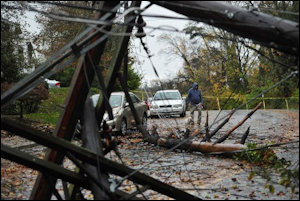
How much is it worth to ensure faster restoration of electric service after a major storm? A lot, if it’s you. Perhaps not so much, if it’s someone else!
by James A. Bacon
Anyone who regards the State Corporation Commission as a wholly owned subsidiary of Dominion Virginia Power really isn’t paying attention. SCC commissioners have their own priorities, and they aren’t necessarily those of Dominion. An example was on display yesterday when the commission held hearings on a Dominion request to spend $140 million to bury its most vulnerable power lines so it could get customers back on line quicker after widespread outages.
The SCC had rejected an earlier Dominion proposal to spend $263 million on a plan to bury the 20% of overhead lines most responsible for outages and time lost. Dominion had argued that burying those lines would cut average electricity restoration times after major storms in half. After the SCC rebuffed that proposal, the utility came back with a scaled-back proposal to spend $140 million, adding a modest $6 per year to customers bills.
Based on their comments and questions, the commissioners did not look favorably upon it. Writes John Ramsey with the Richmond Times-Dispatch:
Commissioner Mark C. Christie said during the hearing that the utility’s calculation of the societal benefit to justify the plan is the wrong measurement since less expensive options to reduce outages — such as increased tree trimming — would have similar impact.
“The whole question about this thing is bang for the buck,” Christie said. “Certainly, you will get fewer outages when the storm comes through. But how do you know all the extra money you spent on undergrounding was more cost-effective than having more trucks out there or tree-trimming or whatever less expensive options?
“We know if you underground a line down a block, we know it’s going to benefit that block in all likelihood. Does that mean it was worth the expenditure that goes into peoples’ bills?
Dominion maintains a portfolio of a dozen different reliability programs, encompassing tree trimming, upgrading old equipment to current standards, and installing sensors to detect failing parts and prioritize investment, among others. (See “Towards a Smarter Grid.”) The company is continually fine-tuning its allocation of resources. For example, it has moved from trimming routes every three years to an approach that takes into account line voltage, how fast the trees grow and many other factors. The inability to trim trees outside of electric-line right of way, said Dominion lawyers at the hearing, places a major restriction on how aggressively the company can trim.
Bacon’s bottom line: Two points…
First: Electric reliability is part of the company’s DNA. One of the metrics Dominion uses to gauge its own performance is the speed at which it restores electricity service. Undoubtedly the SCC commissioners take reliability into account, but they appear to be more concerned at the moment with the impact of spending on rate payers. And who can blame them? Dominion, like other utilities across the country, has spent billions of dollars meeting tougher federal standards for toxic emissions, and it expects to spend billions more meeting the Clean Power Plan standards for carbon emissions. With all the concern over terrorism, cyber-attacks, electro-magnetic pulses and other threats to grid security, the company also is spending hundreds of millions on measures to harden the grid. Ultimately, citizens and businesses pay for all this. In the instance of restoring service after storms, the SCC seems to be prioritizing cost over reliability.
Second: Dominion has sought, or is seeking, SCC approval for a half dozen major electric transmission line projects that have aroused the ire of citizens concerned about the visual impact. Invariably, transmission-line foes suggest burying the line. That option has been prominently suggested for the controversial Surry-Skiffes Creek line which would impact views of the James River near the historic Jamestown settlement. I am speculating here, but I’m wondering if the SCC is skeptical about the cost of burying electric lines in any context, not just for ensuring reliability.
In terms of pure self interest, Dominion has no reason to object to burying distribution and transmission lines — as long as the SCC allows it to recover its costs. If Dominion balks at burying lines, it’s because the executives who deal with the SCC daily and know the minds of regulators anticipate a tough sell before the commission. It may be hard for people to wrap their mind’s around this, but the SCC is boss and Dominion is the supplicant.


